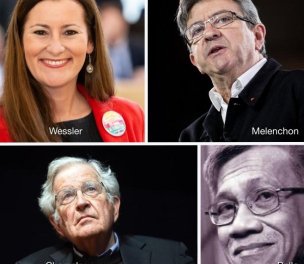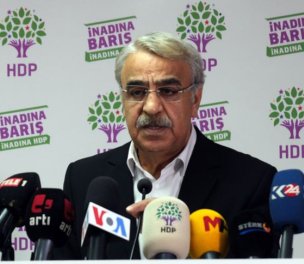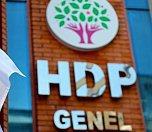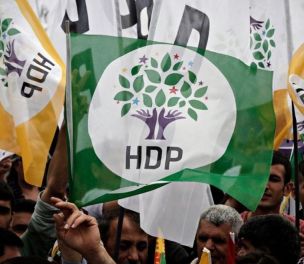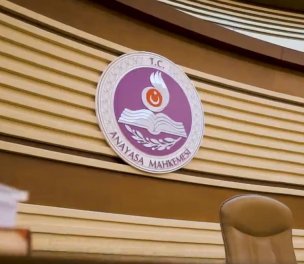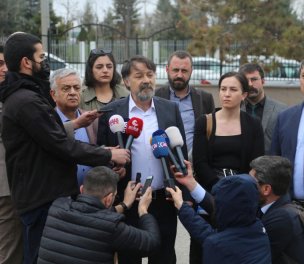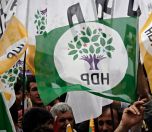RECAP REPORTS
No surprises: How voters in Diyarbakır view the HDP closure case
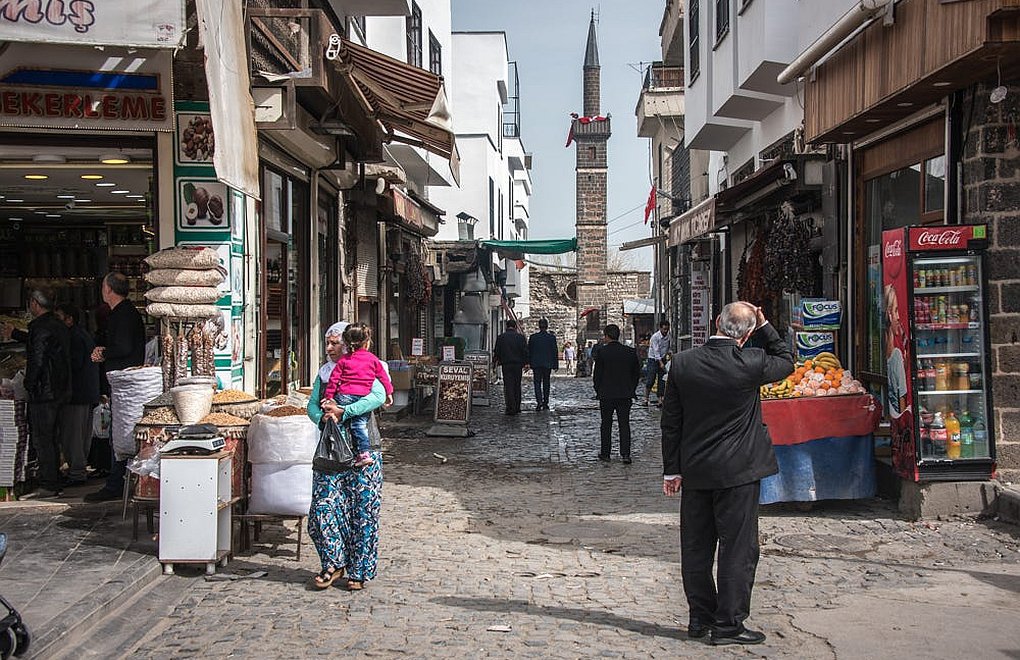
Pedestrians pass the four-legged minaret in Diyarbakır's Sur district. (Photo: Diego Cupolo)
On a Sunday afternoon, a woman in Diyarbakır's historic Sur district spoke her mind but withheld her name over security concerns.
Sitting on a small wooden stool near the city's Grand Mosque, she said the looming closure case against the pro-Kurd Peoples' Democratic Party (HDP) wouldn't mean anything. For her, the HDP means the tree logo during elections because she's illiterate.
"If they cut down a tree, we plant a new one and vote for it," she told Turkey recap.
"We will always have a new seedling to plant," she continued. "They [the state] have closed our parties before, but we didn't give up. We voted for whoever our party told us to vote for. If our party is closed before the elections, we will support the names they share and vote with our eyes closed."
"We will not vote for those who shut down our party and demolish our homes in Sur," she added, referring to the heavy damage caused by the 2015-2016 conflict between Kurdish militants and Turkish armed forces in the central Diyarbakır district.
In March 2021, Türkiye's Chief Prosecutor Bekir Şahin filed a lawsuit seeking to ban the HDP over alleged links to the outlawed Kurdistan Workers' Party (PKK). Şahin also requested a political ban for 451 politicians in the party.
Since the 1990s, seven pro-Kurdish political parties have been shuttered by the state, and two parties dissolved themselves before a verdict following similar warnings from the Supreme Court. The most recent example was the Democratic Society Party (DTP), which was co-chaired by Ahmet Türk and Aysel Tuğluk. The DTP was closed in 2009 and its members were banned from politics.
Now, the HDP faces similar prospects despite its place as Türkiye's third largest party in parliament and having received 11.7 percent of votes in the 2018 parliamentary elections, or about 6 million ballots.
Yet the party closure case comes as no surprise for many voters in Diyarbakır, the political capital of the country's Kurdish-majority southeastern region, where some residents say they would adjust their voting preferences accordingly if the HDP gets banned before the upcoming 2023 elections.
"Diyarbakır experienced similar processes before," Feridun Çelik, the city's former mayor, told Turkey recap. "If they close the HDP, it won't draw people away from their party. In contrast, it will only reinforce the connection they feel. They've done it several times before. And Kurdish political parties returned more powerful every time."
Çelik was the city's first elected mayor from a legal, pro-Kurdish party, the People's Democracy Party (HADEP), which was founded in 1994 and closed in 2003.
The political movement to expand Kurdish rights that the HDP currently represents has faced significant judicial pressure, including the replacement of elected mayors with state-appointed trustees. Over the years, thousands of supporters and politicians have been prosecuted or sentenced to prison.
"Closing parties, arresting supporters or demanding political bans won't help anyone," Çelik said. "Türkiye didn't respond to Kurds' political, social, and cultural demands. Kurdish people don't have an agenda to divide this country. They have demands related to being a nation and those can be solved in a democratic system."
Dr. Vahap Coşkun, a law professor at Dicle University, echoed the notion people in Diyarbakır were familiar with party closures. He said banning the HDP could have negative outcomes for the ruling Justice and Development Party (AKP) and Pres. Recep Tayyip Erdoğan. Coşkun noted Erdoğan based much of his initial career in opposition to party closures.
"The AKP's role in the HDP closure will create a big backlash among Kurdish voters against Erdoğan," Coşkun told Turkey recap. "They will punish him and his party."
Regarding alternative opposition parties that might appeal to HDP supporters, Coşkun said he believes pro-Kurdish voters won't automatically support to the CHP, DEVA or Future Party.
"The main thing that will define Kurdish voters' support for those parties is their policies on the Kurdish issue," Coşkun said. "If the opposition wants to get more votes in Kurdish cities, they should create a political discourse that considers the demands of Kurdish voters."
Diyar Çetedir, a member of the Diyarbakır Bar Association who served as an executive in the Kurdish parties prior to 2018, said the closure of pro-Kurdish parties does not eliminate pro-Kurdish voters.
"The closure of the HDP, which seeks a solution [for the Kurdish question] on a democratic basis, will not adversely affect the public in terms of voting," Çetedir told Turkey recap. "However, it will damage the belief in democracy and be a blow to democratic and civil politics."
Çetedir believes that a possible political ban on 451 politicians will only complicate official proceedings. He said, historically, banned politicians have gained favorability among voters.
"When the DTP was closed, Ahmet Türk was also banned from politics," Çetedir said. "However, his rhetoric still created a response among Kurdish voters. In other words, when banned politicians say, 'We will support this candidate,' HDP voters take this call into account and vote in this direction."
A business owner from Diclekent, one of the wealthy districts of Diyarbakır, also spoke to Turkey recap without sharing his name due to security concerns. (It is a common request from citizens in Diyarbakır when speaking to journalists.)
The business owner recalled the political movement known as the "Thousand Hope Candidates", an independent parliamentary bloc formed by the Kurdish party DTP and three leftist parties in attempt to surpass the 10 percent electoral threshold in the 2007 elections.
"If HDP is closed, nothing will change in our neighborhood," he said. "As in [2007], we will support independent candidates or a newly formed party. Kurds no longer have an election threshold problem and HDP voters in Diyarbakır won't support the AKP."
"Maybe there will be some movement to the CHP and DEVA party," he continued. "However, as Kurds, we remember the former practices of Ali Babacan, Ahmet Davutoğlu and Kemal Kılıçdaroğlu. They only talk about the AKP's misdeeds. We need to hear something else."
He added, "For these parties to get votes from the HDP base, they need to say something about the conflict period in 2016. No one knows if they have an agenda regarding the Kurdish issue."
A taxi driver from Sur told Turkey recap he lost his home during the conflict period and became a tenant in a neighborhood where he has lived for many years.
He said he hasn't voted since the 2015-2016 clashes because he blamed the HDP for what happened, but "If they close the HDP, I will go to the ballot box out of spite," the taxi driver said.
He continued: "They can't even stomach Kurds being active in politics. As if it wasn't enough that we saw such persecution, now they want to close our party. Let them close it. Will it drive us to vote for those who close our party?"
An old Kurdish man listening to the taxi driver agreed and added: "We don't vote for the name or the building of a party. At most, the name and sign of our party will change if they close the HDP. Our vote does not change. But we will remember who shut down our party, who remained silent and who excluded the Kurds." (RÇ/VK)
This report was produced by Turkey recap with support from the Heinrich Böll Foundation in Türkiye and the IPS Communication Foundation.
Click for all Turkey recap articles on bianet





